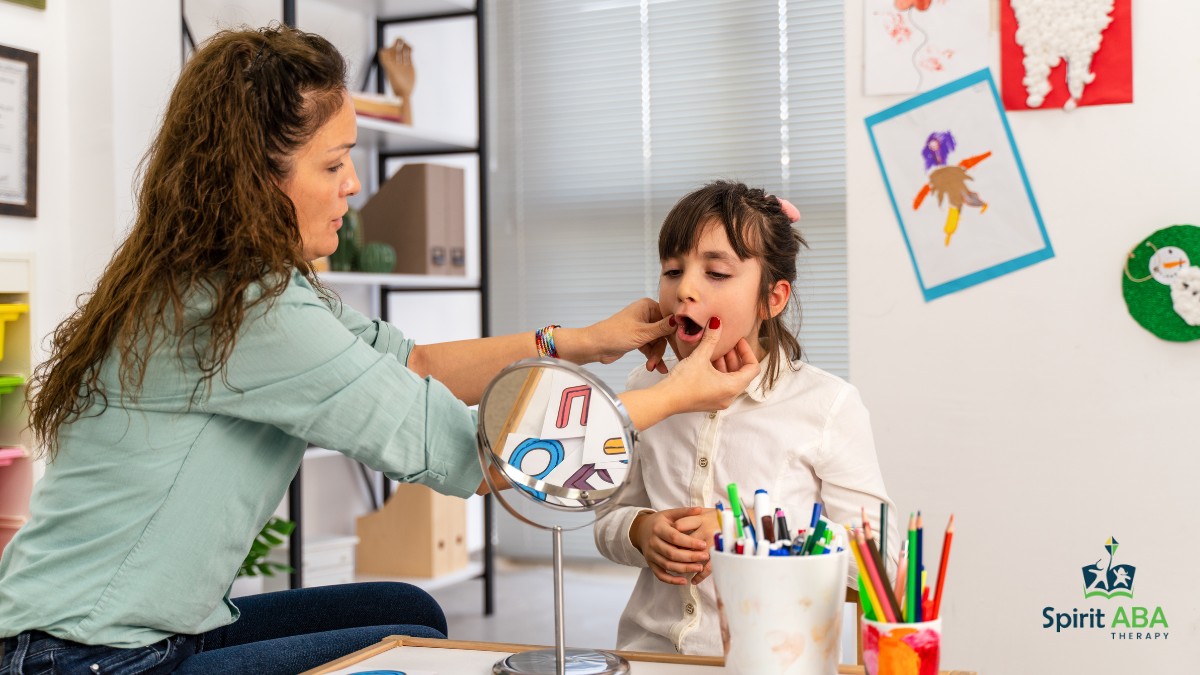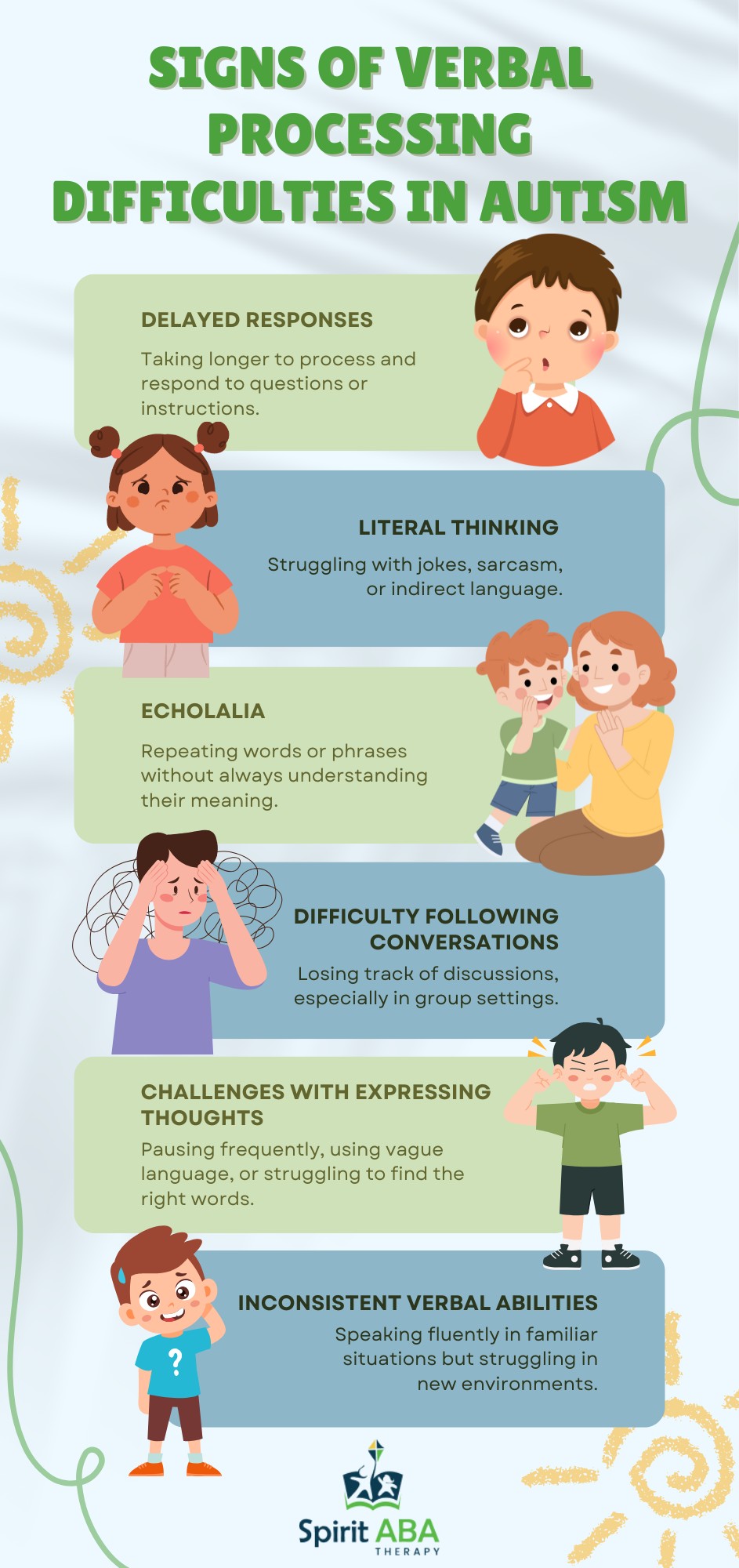Key Points:
- Verbal processing difficulties are common in autism and can affect speech, comprehension, and response time.
- Processing delays and language differences vary widely, requiring individualized support strategies.
- ABA therapy can help improve communication skills by reinforcing language development and alternative communication methods.
Have you ever asked your child a question and waited… and waited… for a response? Many children with autism process verbal language differently, taking longer to understand and respond. This delay isn’t defiance—it’s a challenge with verbal processing. Understanding these difficulties can help you support your child’s communication growth.

What Is Verbal Processing in Autism?
Verbal processing in autism refers to how a child with autism understands, organizes, and responds to spoken language. Unlike typical language development, autistic individuals may experience delays or differences in how they process words, phrases, and conversations.
Why Do Children with Autism Struggle with Verbal Processing?
Language difficulties in autism are linked to differences in brain development and sensory processing. Instead of processing language as a seamless flow, the brain may interpret speech in fragmented or delayed patterns.
Some contributing factors include:
- Auditory processing differences: Background noise or multiple voices can make it hard for a child to focus on spoken words.
- Cognitive processing speed: Some children take extra time to decode and respond to verbal input.
- Sensory overload: Loud environments or too much stimulation can make verbal communication overwhelming.
Each child experiences verbal processing differently. While some may struggle with receptive language (understanding speech), others may have difficulty expressing their thoughts.
Signs of Verbal Processing Difficulties in Autism
Recognizing verbal processing difficulties in autism can help parents and caregivers provide the right support. Children with these challenges may struggle to understand, organize, or respond to spoken language, often leading to frustration in communication.
Common signs include:

These signs can vary widely among children with autism. Some may be completely nonverbal, while others may have advanced vocabulary but difficulty with comprehension. Identifying these challenges early allows parents to use targeted strategies to support language development and improve communication.
How Can Parents Support Verbal Processing in Autism?
Supporting a child with verbal processing challenges requires patience, consistency, and tailored communication strategies. Since every child with autism processes language differently, parents can use a variety of techniques to encourage speech, comprehension, and engagement.
1. Use Clear and Simple Language
Children with verbal processing difficulties often struggle with long or complex sentences. Parents can help by:
- Speaking in short, direct sentences to make communication easier.
- Using visual cues like gestures, pictures, or written words to reinforce meaning.
- Allowing extra time for responses instead of repeating questions too quickly.
2. Encourage Alternative Communication Methods
If verbal speech is difficult, alternative communication tools can help:
- Picture Exchange Communication System (PECS) to help children express needs.
- Augmentative and Alternative Communication (AAC) devices for nonverbal communication.
- Sign language or gestures as an additional way to convey thoughts.
3. Reinforce Communication Through Daily Activities
Parents can build language skills by incorporating speech into everyday interactions:
- Narrating daily tasks (e.g., “Now we’re putting on shoes”).
- Playing turn-taking games to encourage conversation.
- Reading books together and asking simple, direct questions.
4. Use Positive Reinforcement
Praise and encouragement can make a big difference. Celebrate all attempts at communication, whether verbal or nonverbal, to build confidence and motivation.
How ABA Therapy Helps with Verbal Processing Challenges
Applied Behavior Analysis (ABA therapy) is a proven approach that helps children with autism develop communication skills by breaking down language into manageable steps. Since verbal processing difficulties can vary, ABA therapy focuses on individualized strategies tailored to each child’s needs.
ABA therapists use reinforcement-based techniques to encourage speech, helping children expand their vocabulary and improve sentence formation. For those who struggle with language comprehension, therapists teach strategies like visual supports, modeling, and repetition to enhance understanding.
For nonverbal or minimally verbal children, ABA introduces alternative communication methods such as Picture Exchange Communication System (PECS), Augmentative and Alternative Communication (AAC) devices, and sign language to foster meaningful interactions.
Through structured and consistent intervention, ABA therapy strengthens verbal expression, listening skills, and social communication, giving children the tools they need to navigate conversations with greater confidence.
Find Expert ABA Therapy for Your Child at Spirit ABA
Every child with autism has unique communication needs, and ABA therapy can provide the tools they need to thrive. At Spirit ABA, we specialize in helping children build language skills, improve social communication, and gain confidence in expressing themselves.
We provide ABA therapy services in Colorado, Iowa and Nebraska, offering personalized therapy programs tailored to each child’s verbal processing needs. Contact us today to learn more about how we can support your child’s communication journey!


